|
Super Bowl XXI - New York Giants vs Denver Broncos: Pregame
One of the NFL's proudest franchises from 1933-1963, the New York Giants had slipped from perennial contender to oblivion.
- When Ray Perkins became head coach in 1979, the Giants had gone 16 years without making the playoffs. The new coach made his top priority finding a replacement for much-maligned QB Joe Pisarcik–he of the infamous 1978 handoff fumble returned for a touchdown in the final minutes to turn a sure victory over the Eagles into a defeat that cost Coach John McVay his job.
- However, the 1979 draft had no sure bets. The top two prospects were Jack Thompson of Washington State and Joe Montana of Notre Dame. But the Giants scouts zeroed in on the signal-caller at tiny Morehead State in Kentucky, a Division I school. Phil Simms had big hands and a strong, accurate arm that piqued the interest of multiple NFL teams. Quarterback guru Bill Walsh, head coach of the 49ers, came to Kentucky twice to workout Simms. Bill ranked Phil higher than Montana, whom he ultimately drafted after the Giants took Simms.
- When the Giants took Simms with the seventh pick of the first round, their long-suffering fans reacted with boos and the questions "Phil who?" and "Where's Morehead State?"
- "Nobody liked Phil when he first came in," recalled DE George Martin. "Nobody liked him because nobody knew him." But that changed when practices began for the new season. The players quickly learned that Simms was "one tough son of a gun."
With Simms leading the offense, the Giants improved to 6-10 in 1979 as Phil earned a spot on the NFL All-Rookie team.
- But the club regressed to 4-12 in 1980 as Simms dropped from rising star to bust.
- After taking OLB Lawrence Taylor as the second pick in the draft, the Giants finally made the playoffs in 1981 with a 9-7 record. Phil's quarterback rating rose from 58.9 in '79 to 74.0. They defeated the Eagles in the wild card round for their first postseason victory since 1956 but lost to San Francisco in the division round.
- When they slumped to 4-5 in the strike-shortened 1982 season, Perkins resigned to replace Bear Bryant at his alma mater, Alabama. Simms missed the entire season with torn ligaments in his knee.
Bill Parcells, the defensive coordinator, became head coach in 1983.
- He chose Scott Brunner as his quarterback with Jeff Rutledge as the backup. Simms was now third string. After sitting on the bench for the first five games, the onetime quarterback of the future asked to be traded. When Phil was called on with the Giants trailing in Game 6, he completed his first four passes to set up a touchdown. But on his fifth attempt, he suffered a broken thumb when his right hand hit the helmet of a rusher. That made it four seasons in a row when an injury ended his season prematurely. The Giants finished 3-12-1 amid talk that Parcells would be replaced after just one year. Because the Giants led the league in number of players on injured reserve,management gave Bill one more year.
- During the off season, Parcells cleaned house, getting rid of 21 players from the '83 team. Simms, in the option year of his contract, turned down the Giants offer of $1 million over three years. In effect, he was betting on himself to have a good enough season to earn a more lucrative extension. He spent time in the weight room improving his durability and strength. He also watched game film day after day with offensive coordinator Ron Erhardt.
Simms: "My relationship with Parcells took off at the beginning of 1984, his second year as head coach. The Giants had a terrible record in 1983 when I was injured, and I think he concluded during the off-season that I was the personality for his team. When we started playing pretty well and he saw how I handled myself, he realized that we were going to mesh together. He knew he could say things to the team through me, which is what he used me for a lot. If the team was doing something wrong, he'd yell at me. That was his way of communicating to the entire team."
- The Giants changed their offensive philosophy for 1984. Parcells wanted the ball thrown downfield more. Named the starter in mid-August, Simms, the quarterback who had been demoted, injured, and ridiculed, finally started for an entire season and became the first quarterback in team history to throw for 4,000y in a season. The Giants finished 9-7 to make the playoffs. They upset the Rams in the first round before losing to the 49ers again.
- They improved to 10-6 in '85 as Simms, with his lucrative new contract, made the Pro Bowl. He threw for 3,829y with 22 touchdowns and 20 interceptions. The mprovement in the passing game went hand in glove with the improvement in the ground attack. 5'7" 195lb RB Joe Morris, drafted in the second round in 1982, had a breakout year, rushing for 1,336y and scoring 21 touchdowns. This time, the Giants turned the tables on the 49ers in the Wild Card round as Bill Belichick's defense held Montana's unit to three points. But the Bears shut them out in frigid Soldier Field 21-0 the following week on their way to the Super Bowl championship.
His teammates were skeptical of Simms when he was first drafted. But after he stood up against the critical press, came back multiple times after being benched and injured, he earned the respect of Giants on both sides of the ball. WR Phil McConkey recalled: "He worked harder than everybody else. Phil was a gritty, hard-nosed, incredibly competitive, fiery guy with a cannon-strong arm. I can still remember the beatings he took. Two days after, at practice, he'd still be all black and blue. Missed blocks, dropped passes. Phil didn't complain or call anyone out. Phil was simply as tough a football player as there was from any position. He was a perfect fit for that team."
Parcells used the loss in Chicago as a motivation for the 1986 season.
- His attitude was, We're almost there. Push hard in the offseason and we'll make it all the way in '86.
- RB Morris had an even better year than in '85. His 1,516y rushing ranked third in the league.
- After a disappointing loss to Dallas to start the season, the G-men won five in a row before losing at Seattle. They would not drop another game for the rest of the season.
- They were third in the confeSunence in points scored and second to the Bears in points surrendered.
- They clobbered the 49ers 49-3 in the opening round of the playoffs. Then they beat division-rival Washington for the third time, 17-0, to earn the franchise's first Super Bowl berth.
The Denver Broncos had stayed competitive for two years after losing to the Cowboys in Super Bowl XII.
- They failed to make the playoffs in 1980-81-82, finishing 2-7 in the strike-shortened 1982 season.
- The club's fortunes changed with the addition of QB John Elway with the first pick in the 1983 draft. He started as a rookie and was under great pressure. The Broncos made the playoffs that year but were pounded by Seattle in the first round, 31-7.
- Denver jumped to 13-3 to win the AFC West in 1984 and earn a first round bye. But they lost a tough game to the Steelers 24-17 in the Division Round.
- The '85 Broncos finished 11-5 but failed to make the playoffs.
- Only three Broncos remained from the '77 Super Bowl team: DBs Louis Wright and Steve Foley and LB Tom Jackson.
The '86 team duplicated the 11-5 mark, but this time won the AFC West.
- One of their losses came to the Giants at the Meadowlands in Week 12. The NY defense held the Broncos to 80y rushing, forcing Elway to throw 47 passes. He completed 29 for 336y but threw two interceptions, one of which DE George Martin returned 78y for a touchdown.
- The game went down to the wire. Elway led a 73y touchdown drive to tie the game at 16 with 1:55 to play.
- 20 seconds of playing time later, the Giants faced third-and-21 at their own 18. From the shotgun, Simms hit WR Bobby Johnson in stride over the middle for 24y. After a holding penalty, Phil lofted the ball to WR Phil McConkey to the 15 to set up Raul Allegre's winning field goal.
- Denver edged New England 22-17 in the division round to earn a trip to Cleveland for the AFC Championship. The game is forever memorialized for "The Drive" that Elway led to tie the game. Trailing 20-13, the Broncos had the ball on their two with 5:02 remaining. The 15 plays included a 3rd-and-18 conversion and ended with a 5y touchdown pass to Mark Jackson with 0:39 on the clock. The Broncos won in overtime 23-20.
Elway said later about the Cleveland game, "That was the game that really got me started, where I could fulfill some of the expectations of me when I came into the league."
A crowd of 10,000 to 20,000 welcomed the Broncos at the Denver airport that evening.
The press likes to simplify. They billed Super Bowl XXI as Denver passing vs New York running.
The '86 Giants were likened to the '85 Bears.
- Parcells' Giants were a tough, blue collar bunch who (supposedly) ground out victories without trickery. Defense ran the team.
- But the Giants were also boring. They had no Refrigerator; their quarterback didn't wear a headband and travel with an acupuncturist. The Giants didn't make a Super Bowl video.
- Just as the '85 Bears were motivated by their loss to the 49ers in the NFC championship game the year before, the Giants were inspired by their loss to the Bears in the '85 title clash.
- Would the Giants dominate the Broncos the way the Bears toyed with the Patriots in Super Bowl XX?
The teams met the press in Pasadena the Monday before the Big Game.
- Despite having the edge in experience, Simms was the "other" quarterback. "I'm not pretty or exciting. I'm not flash like John Elway. I'm just a lunch bucket kind of guy. Elway? He's an executive quarterback." Phil admitted that the three years of injuries made him think, "Hey, this was never meant to be."
- LB Harry Carson, an 11-year veteran, had endured the dismal seasons. "I don't think I ever felt sorry for myself, but I remember that with two weeks left in the season, I would be thinking, 'Only eight more days of practice, and I'm going home for Christmas.' You would get on the field and play for personal pride."
- If one man epitomized the toughness of the Giants, it was 6'1" 260lb NG Jim Burt. "He's a throwback, a Neanderthal type," said Giants GM George Young. "He could play the game in any era because he is a total football person. ... The problem in sports today is that people play for different reasons, like the big money. But Jim Burt pays because he loves to play."
Line coach Lamar Leachman said, "If he had to, Jim Burt would play on one leg."
Burt himself: "I still can't believe it. I was here when we were at the bottom, and I'm still amazed at how this team was built from the bottom up. It has been a tremendous season for me. First, being named All-Pro and now getting to the Super Bowl. Nothing can match this. Nothing."
The Broncos were determined to reward the devotion of their fans.
- Dan Reeves lauded the Denver fans. 63,000 came to Mile High Stadium Sunday to attend the sendoff for the team that also doubled as a birthday celebration for the head coach. "Anybody who didn't have chills standing out there wasn't human." "I think we're ready," he added. "We're ready to come out here and get to work." He admitted, "I'd give my life to win this game."
- WR Vance Johnson: "I wish I could give those people back something from this game. Those are some fans. The first thing I thought of when Rich (Karlis) kicked that field goal to beat Cleveland was our fans back home. There may have been 80,000 fans barking like dogs at Cleveland Stadium, but I knew we had a lot more than that back home, cheering for us on television."
- Being underdogs by up to 10 points motivated the Broncos. "We were underdogs in Cleveland," said Johnson, "and look who won that game."
CB Louis Wright: "That's showing no respect whatsoever. For the people who make the odds, I'll say obviously they've never played in a championship game. And that's a mistake."
LB Tom Jackson spoke facetiously: "We started out not to even show up for the football game. But we figured we had tickets anyway, so we'l be there."
Coach Parcells ran his squad through the wringer in their first practice at Rams Park in Anaheim. The players ran six 80-yard sprints with Parcells yelling, "Y'all got soft!"
- Burt: "We were treated like dogs. We were worked hard. It was a hard day's work. When that happens and you're in full pads, people tend to get a little nasty."
- Star defender Lawrence Taylor had suffered a right thigh bruise in the NFC title game. "Lawrence is doing fine," said Parcells. "He has full range of motion. He's at full speed now."
- DE Leonard Marshall praised defensive coordinator Bill Belichick. "When he first got here, he wasn't the defensive coordinator. He wasn't anything. Nobody respected him. ... I was just a young player, and if the older guys didn't respect him, what was I supposed to think?" But after the Giants got rid of the players who didn't respect Belichick and made him coordinator, "We saw how much he was putting into the game plan and how much he knew. We grew to respect him a lot."
Simms: "We practiced one week in Giants Stadium and then we went out to California and practiced at the Rams' training facility for the second week. ... For two weeks we were about as hot in practice as any team I've been around. On the Monday before the Super Bowl, we had a knock-down, drag-out football practice. Players were fighting. It was like a live game, very physical. The adrenaline and emotions were high. It was extremely contentious. We always practiced hard, but our practices that week were extraordinarily good. ... I'll never forget the Friday before the Super Bowl, which was our last workout, and when we practiced 'our game,' going over all the situations. And I was throwing strikes. He said, "Goddamn are we hot; we're ready. Save it, Simms, just save it." I had to laugh because that was coming from a man who didn't like to talk in those terms. So we had to be hot."
"We knew all week he was going to have a big game," said TE Zeke Mowatt.
McConkey: "We were so prepared for that game (the Super Bowl). We were prepared two days after we had beaten the Redskins. We were so ready to play that game to a point where we were over-ready."
After the pregame meal at the hotel Sunday morning, offensive linemen Brad Benson and Chris Godfrey shared a taxi with Phil Simms.
- Phil told them, "I feel real good. I'm throwing fastballs today, guys. I'm telling you, I feel great." During the pregame warmups, Simms told his teammates, "I've got it working. I've got the fastball."
- Taylor always amped himself and his teammates up before games. "Let's go out there like a bunch of crazed dogs and have some fun. When you're yelling and your eyes turn red and you feel like slapping your mother, that's when you know you're ready to play ball."
The Giants were 8½ point favorites.
CBS televised the game.
- Pat Summerall and John Madden announced the game, which would attract an estimated 87.2 million viewers. A 30-second commercial cost $600,000.
- Don Criqui and Bob Trump broadcast the game on NBC Radio.
Coach Reeves was upset by the way the player introductions were handled before the game.
- He assumed the rest of his squad would be waiting on the field to greet the starting 11 when they were introduced as they had done all season. But NFL personnel told him both teams would have to be in their bench areas so as not to disturb other groups involved in the pre-game festivities.
- Dan reluctantly consented, telling the officials, "I don't agree with it, but if that's what we've got to do, we've got to do it."
- Imagine his chagrin when, after the Bronco introductions, the Giants charged en masse onto the field and formed a tunnel that their starters high-fived as their names were called.
- Reeves said, "I found out later that Bill Parcells said, 'The hell with it. If they want to fine me, fine, but I'm going to have my team out there.' That's what I should have done."
Neil Diamond sang the National Anthem. Former Packers DE Willie Davis was the guest for the toss of the coin. |
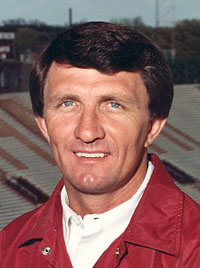
Ray Perkins
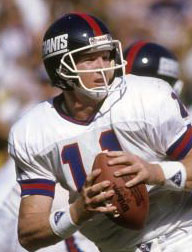
Phil Simms
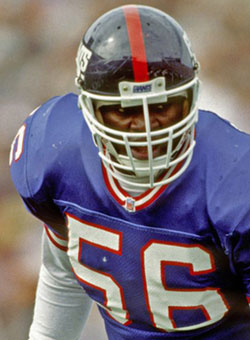
Lawrence Taylor
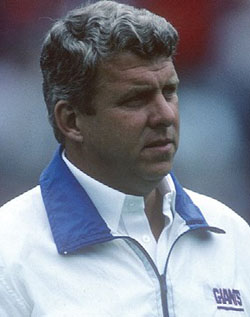
Bill Parcells
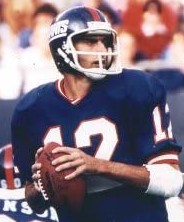
Scott Brunner
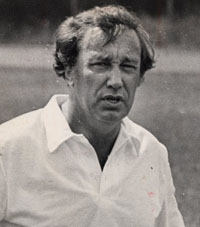
Ron Erhardt
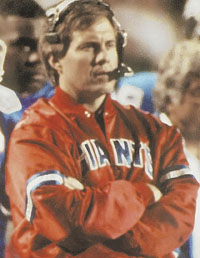
Bill Belichick
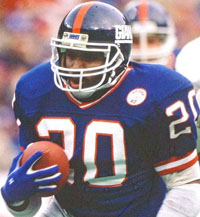
Joe Morris

John Elway
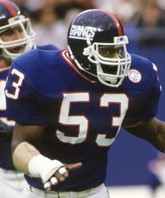
Harry Carson
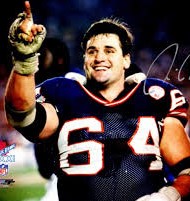
Jim Burt
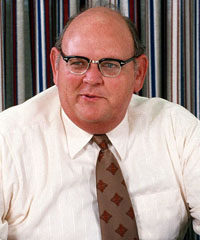
George Young
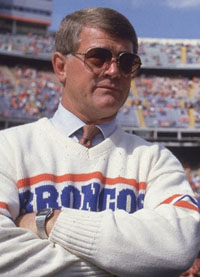
Dan Reeves
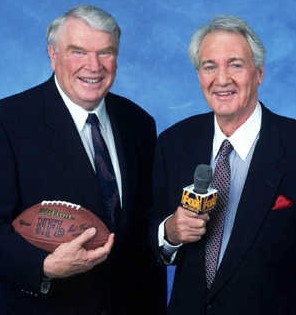
John Madden and Pat Summerall
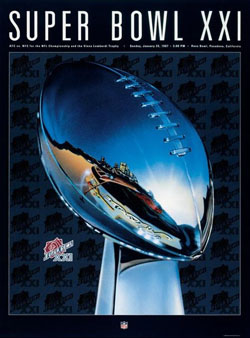
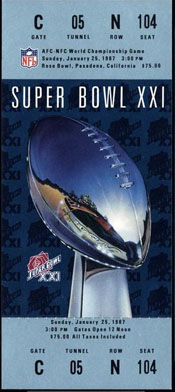
|
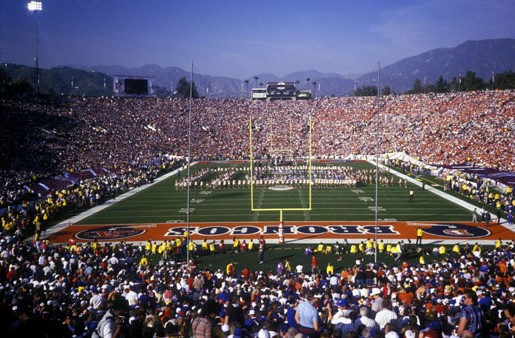
Opening Ceremony
1986 New York Giants
| # |
Player |
Pos. |
Hgt. |
Wgt. |
College |
Exp. |
| 2 |
Raul Allegre |
K |
5-9 |
165 |
Montana/Texas |
4 |
| 5 |
Sean Landeta |
P |
6-0 |
215 |
Towson |
2 |
| 11 |
Phil Simms |
QB |
6-3 |
215 |
Morehead State |
8 |
| 17 |
Jeff Rutledge |
QB |
6-1 |
195 |
Alabama |
8 |
| 20 |
Joe Morris |
RB |
5-7 |
195 |
Syracuse |
5 |
| 22 |
Lee Rouson |
RB |
6-1 |
220 |
Colorado |
2 |
| 23 |
Perry Williams |
CB |
6-2 |
205 |
North Carolina State |
3 |
| 24 |
Ottis Anderson |
RB |
6-2 |
220 |
Miami (FL) |
8 |
| 25 |
Mark Collins |
CB |
5-10 |
195 |
Cal State-Fullerton |
1 |
| 27 |
Herb Welch |
FS |
5-11 |
180 |
Cerritos/UCLA |
2 |
| 28 |
Tom Flynn |
S |
6-0 |
195 |
Pittsburgh |
3 |
| 30 |
Tony Galbreath |
RB |
6-0 |
230 |
Missouri |
11 |
| 34 |
Elvis Patterson |
CB |
5-11 |
190 |
Kansas |
3 |
| 44 |
Maurice Carthon |
RB |
6-1 |
225 |
Arkansas State |
2 |
| 46 |
Greg Lasker |
S |
6-0 |
200 |
Arkansas |
1 |
| 48 |
Kenny Hill |
SS |
6-0 |
195 |
Yale |
6 |
| 51 |
Robbie Jones |
LB |
6-2 |
230 |
Alabama |
3 |
| 52 |
Pepper Johnson |
LB |
6-3 |
250 |
Ohio State |
1 |
| 53 |
Harry Carson |
LB |
6-2 |
255 |
South Carolina State |
11 |
| 54 |
Andy Headen |
LB |
6-5 |
240 |
Clemson |
4 |
| 55 |
Gary Reasons |
LB |
6-4 |
245 |
Northwestern State |
3 |
| 56 |
Lawrence Taylor |
LB |
6-3 |
255 |
North Carolina |
6 |
| 57 |
Byron Hunt |
LB |
6-5 |
240 |
SMU |
6 |
| 58 |
Carl Banks |
LB |
6-4 |
250 |
Michigan State |
3 |
| 59 |
Brian Johnson |
C |
6-3 |
275 |
North Carolina |
1 |
| 60 |
Brad Benson |
T |
6-3 |
270 |
Penn State |
9 |
| 61 |
Chris Godfrey |
G |
6-3 |
265 |
Michigan |
7 |
| 63 |
Karl Nelson |
T |
6-6 |
285 |
Iowa State |
3 |
| 64 |
Jim Burt |
NT |
6-1 |
260 |
Miami (FL) |
6 |
| 65 |
Bart Oates |
C |
6-3 |
265 |
Brigham Young |
2 |
| 66 |
William Roberts |
T |
6-5 |
290 |
Ohio State |
3 |
| 67 |
Billy Ard |
G |
6-3 |
270 |
Wake Forest |
6 |
| 68 |
Damian Johnson |
T |
6-5 |
290 |
Kansas State |
1 |
| 70 |
Leonard Marshall |
DE |
6-3 |
285 |
LSU |
4 |
| 74 |
Erik Howard |
NT |
6-4 |
275 |
Washington State |
1 |
| 75 |
George Martin |
DE |
6-4 |
255 |
Oregon |
12 |
| 77 |
Eric Dorsey |
DE |
6-5 |
280 |
Notre Dame |
1 |
| 78 |
Jerome Sally |
NT |
6-3 |
265 |
Missouri |
5 |
| 80 |
Phil McConkey |
WR |
5-10 |
170 |
Navy |
3 |
| 81 |
Stacy Robinson |
WR |
5-11 |
185 |
Prairie View/No.Dak.St. |
2 |
| 84 |
Zeke Mowatt |
TE |
6-3 |
240 |
Florida State |
4 |
| 86 |
Lionel Manuel |
WR |
5-11 |
175 |
Pacific |
3 |
| 87 |
Solomon Miller |
WR |
6-1 |
185 |
Utah State |
1 |
| 88 |
Bobby Johnson |
WR |
5-11 |
170 |
Kansas |
3 |
| 89 |
Mark Bavaro |
TE |
6-4 |
245 |
Notre Dame |
2 |
|
1986 Denver Broncos
| # |
Player |
Pos. |
Hgt. |
Wgt. |
College |
Exp. |
| 2 |
Mike Horan |
P |
5-11 |
190 |
Long Beach State |
3 |
| 3 |
Rich Karlis |
K |
6-0 |
180 |
Cincinnati |
5 |
| 7 |
John Elway |
QB |
6-3 |
210 |
Stanford |
4 |
| 8 |
Gary Kubiak |
QB |
6-0 |
190 |
Texas A&M |
4 |
| 20 |
Louis Wright |
CB |
6-3 |
200 |
Arizona St., San Jose St. |
12 |
| 22 |
Tony Lilly |
S |
6-0 |
200 |
Florida |
3 |
| 23 |
Sammy Winder |
RB |
5-11 |
205 |
Southern Mississippi |
5 |
| 30 |
Steve Sewell |
RB |
6-3 |
210 |
Oklahoma |
2 |
| 31 |
Mike Harden |
CB |
6-1 |
190 |
Michigan |
7 |
| 33 |
Gene Lang |
RB |
5-10 |
195 |
LSU |
3 |
| 35 |
Ken Bell |
RB |
5-10 |
190 |
Boston College |
1 |
| 36 |
Mark Haynes |
CB |
5-11 |
195 |
Colorado |
7 |
| 43 |
Steve Foley |
FS |
6-3 |
190 |
Tulane |
11 |
| 45 |
Steve Wilson |
CB |
5-10 |
195 |
Howard |
8 |
| 47 |
Gerald Willhite |
RB |
5-10 |
200 |
San Jose State |
5 |
| 48 |
Randy Robbins |
S |
6-2 |
190 |
Arizona |
3 |
| 49 |
Dennis Smith |
SS |
6-3 |
200 |
USC |
6 |
| 50 |
Jim Ryan |
LB |
6-1 |
220 |
William & Mary |
8 |
| 52 |
Ken Woodard |
LB |
6-1 |
220 |
Tuskegee |
5 |
| 54 |
Keith Bishop |
G |
6-3 |
265 |
Nebraska/Baylor |
7 |
| 55 |
Rick Dennison |
LB |
6-3 |
220 |
Colorado State |
5 |
| 57 |
Tom Jackson |
LB |
5-11 |
220 |
Louisville |
14 |
| 59 |
Darren Comeaux |
LB |
6-1 |
225 |
Arizona State |
5 |
| 61 |
Andre Townsend |
DE |
6-3 |
265 |
Mississippi |
3 |
| 62 |
Mike Freeman |
G |
6-3 |
255 |
Arizona |
3 |
| 63 |
Mark Cooper |
G |
6-5 |
265 |
Miami (FL) |
4 |
| 64 |
Billy Bryan |
C |
6-2 |
255 |
Duke |
10 |
| 69 |
Tony Colorito |
NT |
6-5 |
260 |
USC |
1 |
| 70 |
Dave Studdard |
T |
6-4 |
260 |
Texas |
8 |
| 71 |
Greg Kragen |
NT |
6-3 |
245 |
Utah State |
2 |
| 73 |
Simon Fletcher |
DE |
6-5 |
240 |
Houston |
2 |
| 74 |
Dan Remsberg |
T |
6-6 |
275 |
Abilence Christian |
1 |
| 75 |
Rulon Jones |
DE |
6-6 |
260 |
Utah State |
7 |
| 76 |
Ken Lanier |
T |
6-3 |
270 |
Florida State |
6 |
| 77 |
Karl Mecklenburg |
LB |
6-3 |
240 |
Augustana/Minnesota |
4 |
| 80 |
Mark Jackson |
WR |
5-9 |
180 |
Purdue |
1 |
| 81 |
Steve Watson |
WR |
6-4 |
195 |
Temple |
8 |
| 82 |
Vance Johnson |
WR |
5-11 |
185 |
Arizona |
2 |
| 84 |
Clint Sampson |
WR |
5-11 |
185 |
San Diego State |
4 |
| 85 |
Joey Hackett |
TE |
6-5 |
265 |
Elon |
1 |
| 87 |
Bobby Micho |
TE |
6-3 |
235 |
Texas |
3 |
| 88 |
Clarence Kay |
TE |
6-2 |
235 |
Georgia |
3 |
| 89 |
Orson Mobley |
TE |
6-5 |
255 |
Florida State/Salem |
1 |
| 90 |
Freddie Gilbert |
DE |
6-4 |
275 |
Georgia |
1 |
| 98 |
Ricky Hunley |
LB |
6-2 |
240 |
Arizona |
3 |
|
References: Leonard Marshall: The End of the Line, Leonard Marshall and Dave Klein (1987)
The Super Bowl: Celebrating a Quarter-Century of America's Greatest Game (1990)
Super Bowl Chronicles: A Sportswriter Reflects on the First 30 Years of America's Game, Jerry Green (1995)
Super Bowl: The Game of Their Lives, Danny Peary (ed.) (1997)
The Football Game I'll Never Forget: 100 NFL Stars' Stories, selected by Chris McDonell (2004)
Stadium Stories: Denver Broncos, Larry Zimmer (2004)
The Ultimate Super Bowl Book, Bob McGinn (2009)
Super Bowl Gold: 50 Years of the Big Game, Sports Illustrated (2015)
The Super Bowl: The First Fifty Years of America's Greatest Game, David Fischer (2015)
Big Blue Wrecking Crew: Smashmouth Football, a Little Bit of Crazy, and the '86 Super Bowl Champion New York Giants,
Jerry Barca (2016)
The First 50 Super Bowls: How Football's Championships Were Won, Ed Benkin (2018)
The Big 50 New York Giants: The Men and Moments That Made the New York Giants, Patricia Traina (2020)
|
|
















